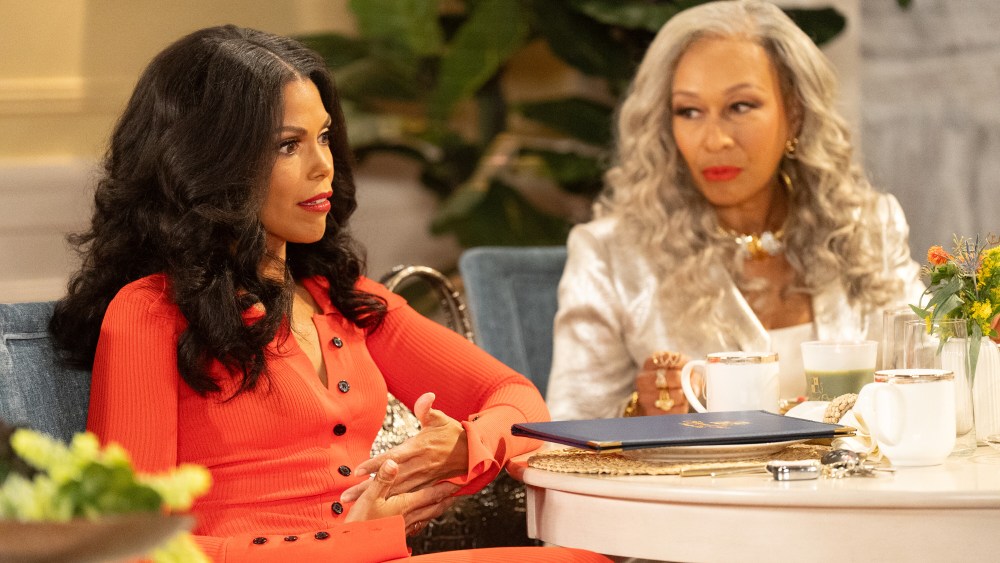A Timely Black Soap Opera
Soap operas, or melodramas with massive ensemble casts, have been a staple in popular culture for nearly a century. Though long-running soaps like “The Bold and the Beautiful” and “General Hospital” have dominated day-time television for decades, CBS‘ new series, “Beyond the Gates,” is the first new soap to debut on daytime TV in nearly 25 years. The Michele Val Jean-created series is also the only soap since 1989’s “Generations” with a predominantly Black cast. Soap operas aren’t considered prestige programming, but this new show offers viewers something more unique than over-the-top storylines and tawdry romances. During a time when minority-led series are vanishing from the small screen and the current government is rampantly attacking diversity, equity and inclusion, “Beyond the Gates” is a reminder that Black people and people of color can’t be erased.
Set in the fictional Maryland suburb of Fairmount Crest, the Duprees, a wealthy Black American family whose roots go back to the actual founding of the community, loom large. At the helm are matriarch Anita (Tamara Tunie, a “Law & Order: SVU” veteran), an EGOT award-winner and her husband, Vernon Dupree (Clifton Davis), a retired congressman. Their adult daughters, Dr. Nicole Dupree Richardson (Daphnée Duplaix) and Danielle “Dani” Dupree (Karla Mosley), are opposites. Nicole is a well-respected philanthropist and psychiatrist, while Dani, a former model-turned-momager, gave up her robust career for love.
Unfortunately, Dani’s bet on love didn’t turn out in her favor. Her ex-husband, Bill Hamilton (Timon Kyle Durrett), a renowned but malicious criminal defense attorney, is set to marry paralegal Hayley Lawson (Marquita Goings). Hayley is the former best friend of Bill and Dani’s eldest daughter, attorney Naomi Hamilton Hawthorne (Arielle Prepetit). The affair and forthcoming wedding have sent Dani into a tailspin, causing her parents and daughters, Naomi and Chelsea (RhonniRose Mantilla), to work overtime to try and temper her emotional outbursts.
Even through the five episodes shared with critics — a week’s worth of episodes — this central story is just a sliver of the goings-on in Fairmount Crest. There are affairs, long-held secrets, whispers of corruption, generational clashes and villainous family members. Every soap opera trope, including the over-the-top dialogue, dramatic cliffhangers and drawn-out storylines, is present in “Beyond the Gates.” What differentiates this series from others, however, are the specificties. Black colloquialisms, like when one character tells another, “You’re as green as collards,” are peppered throughout the dialogue. Moreover, there is a lot of historical grounding. The Fairmount Crest Country Club was established in 1951, just 86 years after the end of the Civil War, showcasing the rise of Black wealth and community-building despite Jim Crow laws and perpetual anti-Blackness. The series also spotlights discussions between Vernon and his grandson Martin Richardson (Brandon Clayborn), a politician with a perspective on civil disobedience that differs from his non-violence-centered grandfather.
One of the main problems with the American experiment is its default to whiteness. While some are currently scrambling to dismiss and erase history and facts, lies will never usurp truth. In fact, we’ve seen this all before. In 1920, in response to D.W. Griffith’s appalling Blackface Ku Klux Klan propaganda film “The Birth of a Nation,” which was lauded nationwide and screened at the White House for President Woodrow Wilson, Oscar Micheaux, who is regarded as the first Black filmmaker, wrote, produced and distributed, “Within Our Gates.” The movie centers on a Black woman navigating Jim Crow-era America, the widespread lynching of Black people across the South, the rise of the KKK and the Great Migration. Not only did the film illustrate the horrors and violence of white supremacy, but it also offered audiences a realistic perspective of Black life. “Within Our Gates” is considered an integral part of American Cinema and is likely where “Beyond the Gates” got its name.
Though Black Americans are integral in every aspect of American culture, racism and discrimination have kept the entire country on a roller coaster of Black visibility and erasure. In 1984, sixty-four years after Micheaux debuted “Within Our Gates,” “The Cosby Show” premiered on NBC, allowing American viewers a window into Black lives that weren’t downtrodden. Bill Cosby’s personal legacy has unfortunately usurped the significance of the series. Still, it was the first time some white people and other POC had ever seen the inner workings of a well-to-do, traditional Black family.
A partnership between CBS Studios, the NAACP and Procter & Gamble Studios, “Beyond the Gates,” is the latest example of why representation is so important. A country and a society lacking curiosity about anyone other than the mainstream will continually struggle with compassion and devalue humanity. Series like “The Jeffersons,” “A Different World,” “The Fresh Prince-of-Bel Air,” and even more recently, “Insecure” depict Black Americans who, like other folks of color in America, have long-established lineages, lives and legacies despite horrendous circumstances. Their contributions to the establishment and fabric of America are tenfold.
“Beyond the Gates” is a reminder that just like everyone else, Black people have a right to thrive and be seen without the dark shadows of white supremacy thrusting chaos into our lives. The human condition is challenging enough. During such a pivotal moment in our society, Black Americans will continue to flourish as they navigate their personal and professional lives, and we won’t be asking permission to do. History has already shown us all we need to know.
“Beyond the Gates” premieres at 2 p.m. ET on Feb. 24 on CBS, with new episodes dropping every weekday.


